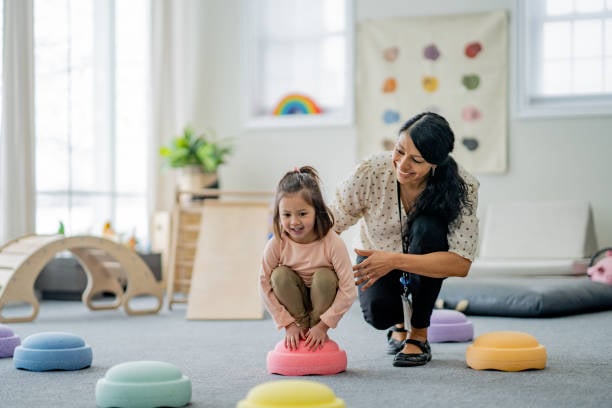April is National Occupational Therapy Month! Have you ever been curious about your child’s development? Are you seeking insight on how to best support your child during times of dysregulation or upset? Do you wonder if your child could benefit from support to increase independence across self-care activities or social situations? Read on to learn more about the role of occupational therapy in supporting a child’s ability to navigate their daily lives.
What is Pediatric Occupational Therapy?
Pediatric occupational therapy supports children in developing foundational skills needed to participate and thrive in their everyday activities. Occupational therapy targets activities of daily living, gross motor skills, fine motor skills, executive functioning, emotional regulation, sensory processing, social skills, and more! Let’s dive into each of these areas further and see how occupational therapy may help support your child’s development.
What are Activities of Daily Living (ADLs)?
Activities of daily living include dressing, grooming, personal hygiene, self-feeding, and toileting. Occupational therapists assist children in developing self-care skills to maximize independence. Using a play-based approach, our occupational therapists are skilled at breaking down activities into small, manageable parts, making learning everyday self-care activities fun and engaging!
Indicators for seeking support for ADL engagement and independence:
- Difficulty sequencing the steps of dressing
- Challenges manipulating clothing fasteners (zippers, buttons, snaps etc.)
- Difficulty with toileting training
- Aversions to various clothing textures or types
What are Gross Motor Skills?
Gross motor skills include running, jumping, catching/throwing, crawling, walking, standing, and more. Occupational therapists are specialized to evaluate and assist children in improving motor skills, balance, strength, and endurance, providing children with the means to actively explore and participate in their daily lives. At More to Say, our occupational therapists can provide a comprehensive evaluation, helping parents identify if their child is meeting gross motor developmental milestones.
Indicators for support:
- Has uncoordinated movements
- Frequent falls when walking or running
- Difficulty with crawling, sitting, walking, etc.
- Hesitancy to engage in gross motor play with similar-aged peers
- Difficulty maintaining upright posture when seated
- Frequent “W” sitting
What are Fine Motor Skills?
Fine motor skills support our ability to write, draw, manipulate clothing fasteners, open food packaging, and pick up small objects. Pediatric occupational therapists can support the development of age-appropriate grasps on everyday objects (pencils, scissors, glue, spoon/fork, etc.), allowing children to thrive in school, self-care, and play activities!
Indicators for support in fine motor development:
- Difficulty picking up small objects with fingers
- Increased fatigue with handwriting or drawing activities
- Loose or immature grasp on pencils, utensils, scissors, etc.
- Poor handwriting legibility
- Frequent application of too much or too little force to objects
- Poor coordination during self-feeding with a fork or spoon

What is Executive Functioning?
Executive functioning skills allow us to plan, sequence, and complete daily activities. Some specific components of executive functioning include working memory, inhibitory control, and cognitive flexibility. With these skills, children are able to sequence through multiple-step activities, navigate unexpected changes across daily routines, and complete academic tasks successfully.
Indicators for support:
- Frequent upset with unexpected changes in routines
- Difficulty completing multi-step activities (school activities, rule-based games, sequencing morning/night routine, etc.)
- Challenges with following directions or staying focused on a task
What is Emotional Regulation?
Emotional regulation includes our ability to identify emotions, express our feelings, and regulate accordingly. Pediatric occupational therapists provide children with tools to identify common emotions and implement self-calming strategies during times of dysregulation. When targeted through our play-based, naturalistic approach, our occupational therapist can support children in expressing their feelings and mediating through conflicts across play activities, social interactions, and daily routines.
Indicators for support in emotional regulation development:
- Frequent emotional outbursts occurring daily or multiple times a day
- Difficulty identifying one’s emotions and expressing oneself
- Increased time required to calm down following upset
- Caregiver is unsure how to navigate tantrums or meltdowns
What is Sensory Processing?
Our sensory system determines the way we take in, process, and engage in our world. Our sensory system is comprised of various systems including vision, hearing, touch (tactile), smell, taste, vestibular (balance), proprioception (awareness of body position and space), and interoception (awareness of body cues for hunger, thirst, digestion, pain etc). Our sensory system impacts our everyday lives in countless ways, including interpreting how our clothes feel on our bodies, how we respond to various environmental factors (lighting, large crowds, loud noises), as well as how much movement or activity we need in order to feel regulated. Occupational therapists at More to Say take a comprehensive look into a child’s sensory systems and preferences, creating individualized sensory activities and strategies to support improved regulation.
Indicators for support in sensory processing and modulation:
- Adverse reactions to loud noises, bright lights, or clothing textures
- Constantly moving, spinning, or touching items
- Difficulty identifying hunger, thirst, need to use the bathroom, or temperature changes
- Frequent bumping into objects or others
- Engaging in thrill-seeking activities such as jumping/climbing to or from increased heights
- Frequent mouthing of inedible objects (clothing, toys, pencils)

_____
How Can We Help?
At More to Say, we use a play-based approach to meet children where they are at and foster improved confidence and independence within their daily lives. Through individualized, family-centered treatment, we provide families with the tools to continue to learn and grow beyond therapy, supporting the carryover of skills into natural environments (school, home, community settings).
If you believe your child may benefit from our services, we would love to schedule a phone screening or a comprehensive occupational therapy evaluation at our Branford or Oxford, CT clinic. Call us at (203) 828-6790 or email us at info@moretosayct.com to schedule!



